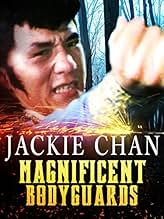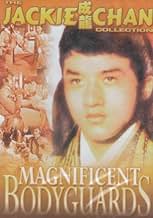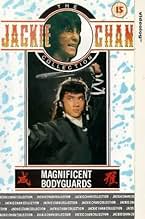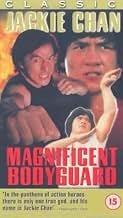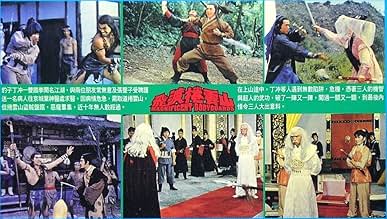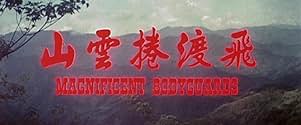Ajouter une intrigue dans votre langueA Kung Fu master assembles guards to escort an ailing person through dangerous "Stormy Hills" terrain infested with bandits, savages, and evil monks to reach a doctor before it's too late.A Kung Fu master assembles guards to escort an ailing person through dangerous "Stormy Hills" terrain infested with bandits, savages, and evil monks to reach a doctor before it's too late.A Kung Fu master assembles guards to escort an ailing person through dangerous "Stormy Hills" terrain infested with bandits, savages, and evil monks to reach a doctor before it's too late.
- Réalisation
- Scénario
- Casting principal
Szu-Cheng Mu
- Wen Liang Yu
- (as Chiang Kao)
Avis à la une
Here is a movie filmed in 3-D and now it is about 40 years later and I am watching it at home in 2-D in about VHS resolution with dual Chinese and English subtitles. As bad as this movie is the 3-D badness is all I can focus on. Kicks, spear points and even bell clangers are used to take advantage of the 3-D effect but now all these shots seem out of place and jarring. I refuse to believe that years ago these odd angles and objects suddenly stuck in front of the audience face did anything to improve the action. I like old Viewmasters but otherwise 3-D is the worst idea in movies.
When I watch terrible movies like this I try to find a "moment". Even the worst movie can have a special moment, not necessarily scripted, that hits a nerve, sparks a memory, or just creates something special out of the nothingness. Not all movies have a moment but this one does. At about 47 minutes James, Bruce and Jackie are standing next to each other thinking. Then James gets this expression on his face "What the heck is going on here?" and he walks off. Then Bruce does the same thing, then Jackie. Yes, that was the defining moment of the movie – what the heck is going on here!- then they all leave!
When I watch terrible movies like this I try to find a "moment". Even the worst movie can have a special moment, not necessarily scripted, that hits a nerve, sparks a memory, or just creates something special out of the nothingness. Not all movies have a moment but this one does. At about 47 minutes James, Bruce and Jackie are standing next to each other thinking. Then James gets this expression on his face "What the heck is going on here?" and he walks off. Then Bruce does the same thing, then Jackie. Yes, that was the defining moment of the movie – what the heck is going on here!- then they all leave!
It is a pervasive feature of the written history of Chinese martial arts films (from CFW's long-extinct periodical "Martial Arts Movies" to the pioneering coffee table book "Martial Arts Movies: From Bruce Lee to the Ninjas" by Ric Meyers) that Jackie Chan languished in a series of both artistically and commercially disastrous films before attaining stardom in 1978 with "Snake in the Eagle's Shadow". The general idea is that Chan was being held back by his director/mentor Lo Wei, who was such a humorless square that he saw no merit in Chan's comedic aspirations and insisted on trying to sell the young actor as the new Bruce Lee in a series of straight dramatic roles. This contention has been repeated so often that even today it is uncritically accepted as fact. Well, guess what? It's a bunch of baloney. In the first place, Chan starred in only one Bruceploitation film: "New Fist of Fury". Thereafter, he was cast in period costume productions (in contrast to Lee, who never made a period film). Secondly, some of these movies--like "Snake and Crane Arts of Shaolin" and "Spiritual Kung-Fu"--featured comedic elements. Thirdly, Chan almost always did a respectable job when assigned a dramatic role. Finally, while there's no doubt that comedy kung-fu made him a star, it's debatable how good films like "Snake in the Eagle's Shadow" and "Drunken Master" really are. They were wildly popular, certainly, but unless you consider slapstick the highest art ever achieved by human civilization, they're pretty cringeworthy. "Magnificent Bodyguards", neither a deadly serious dramatic picture nor a screwball comedy, stars Chan alongside James Tien and Leung Siu-lung (Bruce Leung); they are martial arts experts who have been hired to escort a sick man on his journey to see a physician. Along the way they fight off bandits, hostile Buddhist monks and an assortment of other characters. Based on a tale by Taiwanese wuxia novelist Ku Lung, the film is not a classic by any means, but it's watchable. There are lengthy, entertaining fight scenes and Chan does just fine in his non-comedic role. (Bizarrely, the movie was shot in 3D, which is why there are so many kicks and jabbing weapons aimed directly at the camera.) Further putting the kibosh on the myth that Chan's early films were all unmitigated disasters, "Magnificent Bodyguards" was a success at the box office. Don't believe everything you read!
This is a typically bizarre early Chan film, made by Lo Wei. It concerns Chan escorting a woman across a dangerous valley to find a cure for her sick "brother". Although not a classic, this film does contain a number of impressive fight scenes,although the script is messy and often confusing. Still,it's nice to see Chan in his long-haired seventies days!
Cool movie! Features a long-haired 24-year old Jackie Chan, great costumes, an improbably complicated plot, a bizarre song in the middle, American-Indian Mongol hordes, pre-Matrix "bullet time" fx, and much more.
Basically, Jackie and cohorts - the magnificent bodyguards of the title - are hired to guard and transport a valuable cargo over some dangerous, bandit-infested mountains. Of course, nothing is what it seems, no-one can be trusted and there appears to be a lost tribe of American Indians wandering the hills.
The version I saw was subtitled - it was fun hearing the original Chinese. Maybe that let the humour come out more. The movie doesn't take itself too seriously and only gets serious at the very end.
Well worth a watch.
Basically, Jackie and cohorts - the magnificent bodyguards of the title - are hired to guard and transport a valuable cargo over some dangerous, bandit-infested mountains. Of course, nothing is what it seems, no-one can be trusted and there appears to be a lost tribe of American Indians wandering the hills.
The version I saw was subtitled - it was fun hearing the original Chinese. Maybe that let the humour come out more. The movie doesn't take itself too seriously and only gets serious at the very end.
Well worth a watch.
This film has never shown in Japanese movie theatre although Jackie was superstar for more than two decades. You will enjoy this if you don't sleep.(It's not easy!) I thought it was something like a mixture of the old Japanese Samurai story and the Western Cowboy film. You will see so many naked indians although it's story is in China - they look so stupid like Monty Pythons' comedy. And you will see the guy with 6 fingers on his hand.You will hear some Star Wars soundtracks.Kung-Fu actions with 3D camera tricks are so shabby, maybe one of the worst ones in Jackie's all films ever made. But you gonna like this garbage if you like 70's cheap and crazy Kung-Fu films.I like this one because this is definitely one of the most stupid films I've ever seen. Even more stupid than Austion Powers!!!!
Le saviez-vous
- AnecdotesThis was the first movie in Hong Kong to be filmed using 3-D technology.
- Versions alternativesOriginally issued in 3-D.
Meilleurs choix
Connectez-vous pour évaluer et suivre la liste de favoris afin de recevoir des recommandations personnalisées
- How long is Magnificent Bodyguards?Alimenté par Alexa
Détails
Contribuer à cette page
Suggérer une modification ou ajouter du contenu manquant

Lacune principale
By what name was Magnificent Bodyguards (1978) officially released in Canada in English?
Répondre
